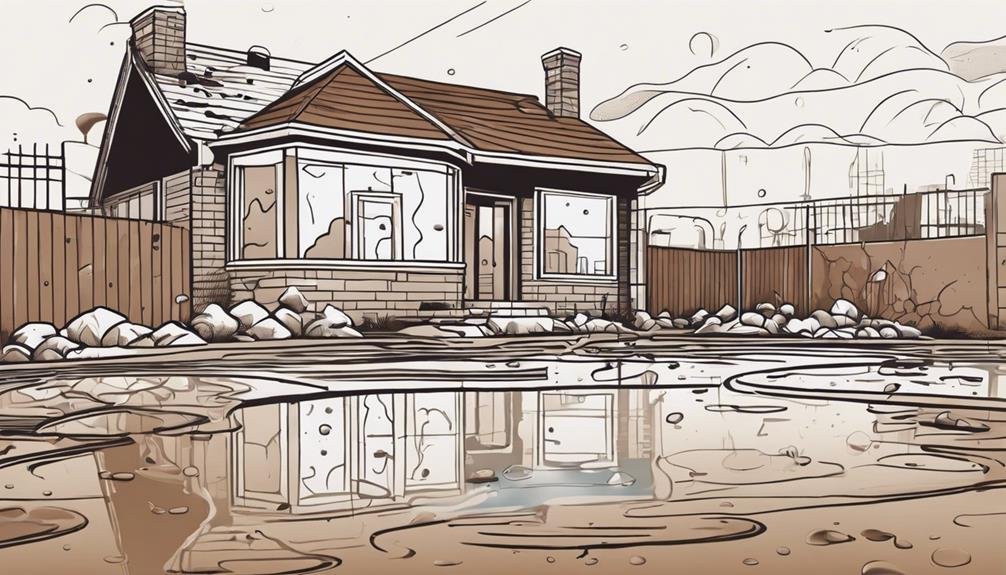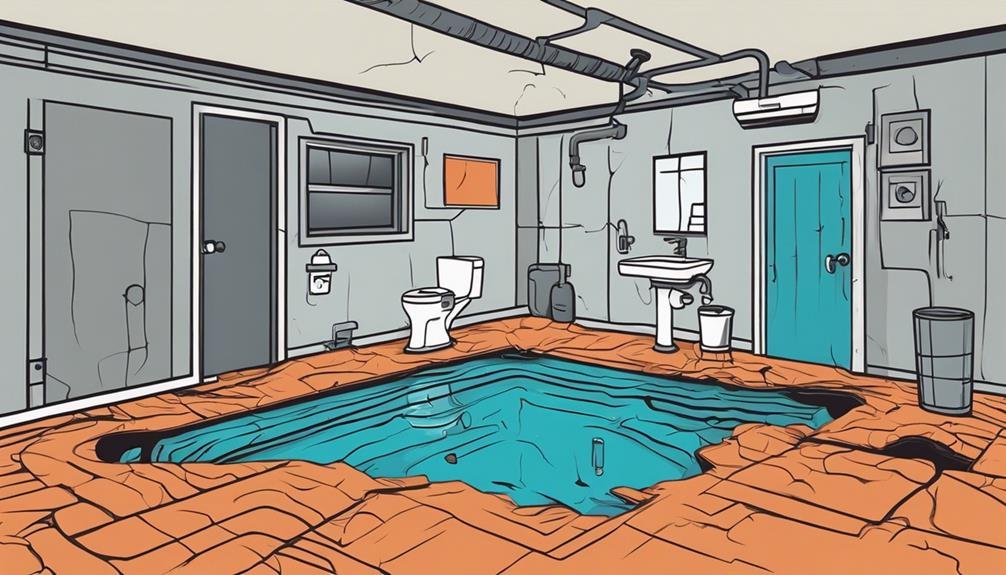When it comes to your septic system, it's like the unsung hero silently working beneath the surface. But what happens when this hero starts to falter?
Foul odors wafting in unexpected places, drains sluggish in their duty, and peculiar green patches dotting your yard are just some of the signs trying to grab your attention. But wait, there's more to uncover about these signals that shouldn't be dismissed so lightly.
Key Takeaways
- Foul odors indoors and outdoors indicate septic tank backup.
- Slow draining fixtures may signal septic system problems.
- Lush green patches in the yard signal septic system issues.
- Gurgling sounds from drains suggest septic system issues.
Foul Odors Indoors and Outdoors

If you notice foul odors indoors or outdoors around your property, it could be a sign of a septic tank backup. These unpleasant smells are often the result of gases escaping from the septic system due to a blockage or overflow. To address this issue, consider implementing odor control solutions. One effective method is to use special vent filters designed to trap and neutralize these odors before they can spread. Additionally, regular maintenance and inspection can help prevent such backups from occurring in the first place.
Preventative maintenance strategies are crucial in ensuring your septic system functions properly. This includes scheduling routine inspections by professionals to check for any signs of damage or blockages. Regular pumping of the septic tank is also essential to prevent backups and maintain the system's efficiency. By following these preventative measures, you can minimize the chances of experiencing foul odors and other septic tank issues on your property.
Slow Draining Fixtures
When encountering slow draining fixtures in your home, it may indicate a potential issue with your septic system's functionality. Slow drainage in sinks, showers, or toilets can be a sign of a clog or a more serious problem within your septic tank. Before calling for professional maintenance, you can try some DIY solutions to address the issue.
Start by using a plunger on the affected fixture to attempt to dislodge any blockages. If this doesn't work, a mixture of hot water and dish soap poured down the drain can sometimes help break up clogs. For more stubborn cases, a drain snake or auger can be used to physically remove the blockage. Additionally, enzymatic drain cleaners can be effective in breaking down organic material causing the obstruction.
If these methods don't resolve the slow draining fixtures, it's essential to seek professional maintenance. A septic tank specialist can inspect your system for any underlying issues and provide the necessary repairs to ensure proper functioning.
Lush Green Patches in Yard

To determine if your septic system is experiencing issues, observe any lush green patches in your yard that could indicate potential problems. These unusually vibrant patches may seem appealing at first glance, but they can signal underlying septic tank troubles. The lushness is often a result of excessive moisture in the soil caused by a septic system leak or backup. When your septic tank isn't functioning correctly, it can lead to the release of excess nutrients, enriching the soil and promoting lush growth in certain areas.
Moreover, if you notice unexplained puddles forming in conjunction with these green patches, it further supports the likelihood of septic system issues. These puddles can result from the overflow of wastewater due to a backup or leak in the system. The combination of lush green patches and unexplained puddles in your yard is a strong indication that your septic tank may be in need of inspection and maintenance to prevent further complications.
Gurgling Sounds From Drains
Listen attentively for gurgling sounds emanating from your drains as they can be indicative of potential septic system issues. Gurgling noises often occur when there's a blockage or buildup in your plumbing system, causing air bubbles to rise as water tries to flow through. This can signal a problem with your septic tank or drain field that requires immediate attention. Ignoring these sounds can lead to more severe issues like sewage backup in your home.
To prevent gurgling sounds and maintain a healthy septic system, regular plumbing maintenance and septic tank care are crucial. Ensure that your septic tank is pumped regularly to prevent solid waste from accumulating and clogging the system. Additionally, be mindful of what goes down your drains to avoid blockages that can disrupt the natural flow of wastewater.
Sewage Backup in House

If you notice sewage backing up into your house, it's crucial to address the issue promptly to prevent further damage and health hazards. Sewage backup in the house can occur due to various reasons such as clogged pipes, tree root infiltration, or a full septic tank.
To prevent sewage backup, consider implementing prevention methods like regular septic tank maintenance, being mindful of what you flush down the drains, and installing backwater valves.
When faced with sewage backup in your house, seeking professional help is paramount. A professional plumber can assess the situation, identify the root cause of the backup, and recommend the best course of action to resolve the issue. They have the expertise and tools to safely handle sewage cleanup, disinfection, and repairs, ensuring that your home is restored to a safe and habitable condition.
Ignoring sewage backup can lead to extensive damage to your property and pose serious health risks to you and your family. Therefore, taking swift action and enlisting professional help are crucial steps in addressing sewage backup in your house.
Conclusion
If you notice foul odors, slow draining fixtures, lush green patches in your yard, gurgling sounds from drains, or sewage backup in your house, don't ignore these signs of septic tank backup.
Addressing these issues promptly can prevent further damage and costly repairs.
Take action now to ensure your septic system is functioning properly and avoid a messy cleanup later.
Don't wait until it's too late – act now to prevent a septic tank disaster.

